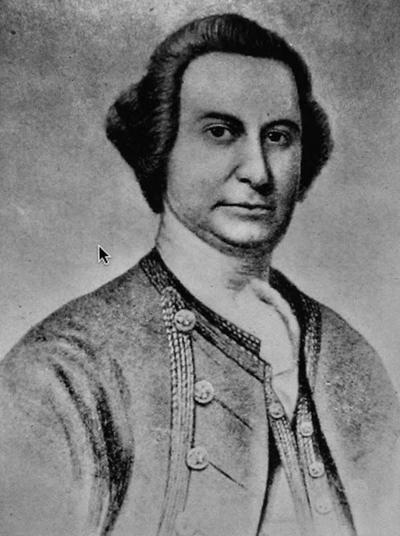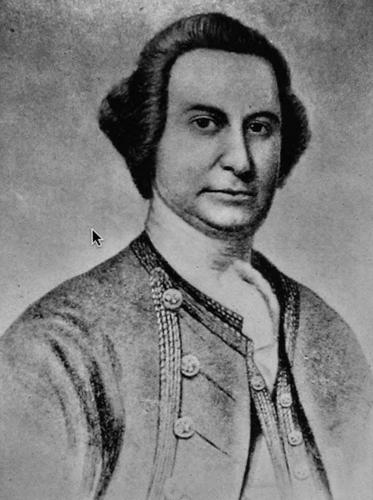If Sir William Johnson wasn’t naturally a Type A workaholic, the life he led as Indian Superintendent certainly made him one. His letters frequently complain of on-going ailments, plus continually being annoyed almost to death by Indian-related obligations. During one period of ill health, in January 1764 for example, Johnson informed General Gage, “the Indians give me not a moments rest, being continually at my bedside.” Even when he was ill, they didn’t leave him alone.
As time passed, his constant mental stressors must have considerably aggravated his physical ailments, while facing endless challenges that would have broken the constitution of lesser men.
Johnson’s earliest physical problem we know of began in 1755 at the Battle of Lake George when he was hit in the thigh by a musket ball. This unremovable ball plagued him painfully the rest of his life on and off, but mostly on. On September 9th, 1755, Johnson wrote to General William Shirley, “My wound wch is in my Thigh is very Painful, the Ball is lodg’d and Cannot be got out, by which means I am to my Mortification Confined to my Tent.” No reliable medicines existed, although the catalog of herbs and more arcane nostrums he tested hoping for relief is large. On October 10th, he wrote that the ball caused “violent inflammation” in his head, ears and throat, confining him to bed back home at Fort Johnson, and putting him through “inexpressible torment.” His pain lessened somewhat over the winter but returned in the summer of 1756 forcefully, leaving him too weak to sit up or walk without aid. Starting in November 1756 and continuing through November 1757, he experienced considerable relief, but soon again, according to former Johnson Hall Superintendent Wanda Burch, “he became so ill he could not write letters himself nor turn on his side until January 1758.”
Johnson wrote little about it during 1759 and 60, but during 1761, he found himself plagued by additional symptoms – high fever lasting days, severe stomach spasms, jaundice and a prolonged physical weakness allowing him very little movement.
There were certainly practical reasons why, when Johnson Hall was built, both his office and bedroom were on the first floor. Many letters written to him during the 1760’s by sympathetic friends contain medical advice and sometimes new medicines, and certainly Molly Brant, with her extensive knowledge of herbs, did what she could to relieve his various conditions. Warren Johnson, who visited his famous brother during the winter and spring of 1760-61, writes of well-intended Indians frequently bringing “herbs gathered in the woods.”
Poor Sir William. On February 20th, 1766, he wrote to General Gage, complaining that for the past six years more or less, “I have been at different periods attacked with a violent disorder of the bowels, which often produces a delirium and from several symptoms, I expect a return of it daily. My (leg) wound every year grows more troublesome”. Ms. Burch observed that “Gum and toothache problems began in the 1760’s and continued until his death, and he bled profusely from razor nicks.”
What a wreck he was, nevertheless striving to discharge his high office’s many obligations, while also carving out his own land empire. Ms. Burch relates, “A particularly severe attack occurred in the early spring of 1768, brought on by a cold acquired at an Indian conference at which protocol required his sitting in the snow in front of his courtyard for several hours each session.”
Upon the advice of friends and doctors, the workaholic finally agreed to leave his patrimony to seek the hoped-for benefits of the ocean. On April 25th, 1768 he wrote to colonial governor Sir Henry Moore, “My indisposition has reduced me so low that I am ordered to lose no time in going to the salt water. I shall probably be absent two or three months.” He spent the time in and around New London, Connecticut and various area islands fishing, hunting, drinking and relaxing, and judging by the continual orders for powder and shot, he targeted everything that flew. Later he also visited Long Island’s Hamptons, writing to Sir Frederick Haldimand on August 28th from Montauk Point.
In late November, with both his restorative vacation and the exhausting three months of the Fort Stanwix Treaty that followed behind him, Johnson wrote to Eyre Massey, “There I spent near three months, and at my return I was obliged to go to your old Fort Stanwix to hold a treaty, etc.” The workaholic Johnson had been wise to accept friends and doctor’s advice about visiting the ocean: he might never have had enough strength to endure the Fort Stanwix ordeal without it.
If the ocean helped him once, Johnson must have reasoned, it would again. He returned in the summer of 1773.
Again he stayed at Montauk, East Hampton and New London, and again his heath temporarily improved, but he wasn’t pleased with his Montauk lodgings: on August 28th he remarked, “I am but in a very Indifferent Situation here for writing, an Empty Indian House with scarce a Table to set down to.” Improvement or not, he would be dead in a year.
When one examines Johnson’s litany of sufferings, one wonders how he lived so long, and also how he still managed to produce eight children with Molly Brant. At least one part of him was still working.










